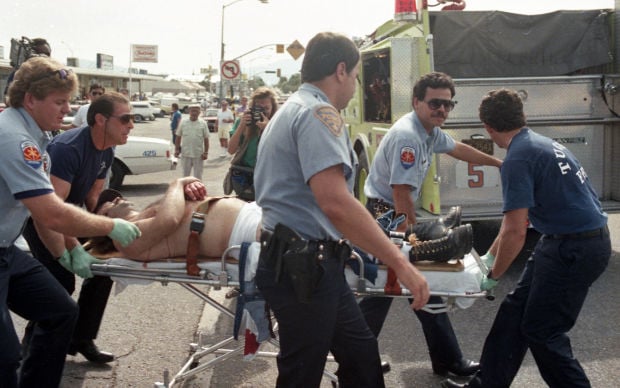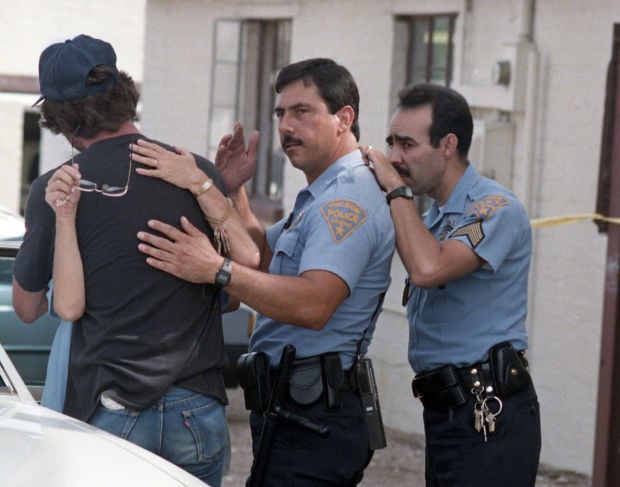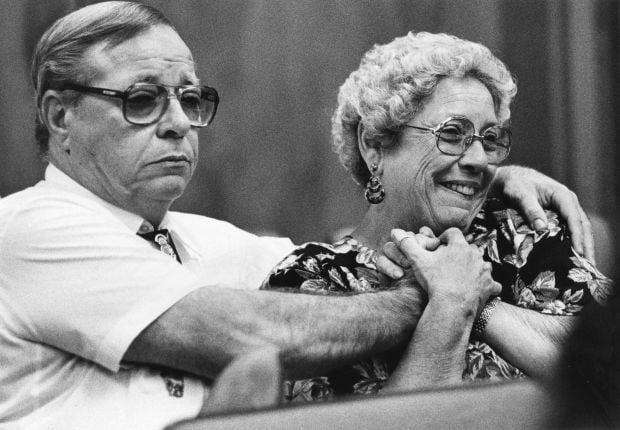Joseph Rudolph Wood’s execution ended one hour and 57 minutes after it started, and after several court challenges over the combination of drugs Arizona used.
Wood spent more than an hour gasping and snorting before being declared dead at 3:49 p.m. Wednesday — turning up the spotlight on arguments his lawyers made in last-ditch appeals, questioning where the state obtained the drugs and how it developed its method of lethal injection.
Wood’s execution lasted long enough that his lawyers filed an emergency appeal with the U.S. Supreme Court trying to stop it while it was going on. Defense lawyer Dale Baich called it a botched execution that should have taken 10 minutes.
But Richard Brown — the brother-in-law of one of two Tucsonans Wood shot to death nearly 25 years ago — witnessed the killings and on Wednesday witnessed the execution. At a news conference afterward, Brown said Wood received the punishment he deserved.
“The last time I was close up to him he shot my sister-in-law to death,” said Brown.
Wood killed his ex-girlfriend, Debbie Dietz, 29, and her father, Eugene Dietz, 56, at the family’s midtown shop, Dietz and Sons Auto Paint and Body Shop, in August 1989.
Eugene Dietz’s daughter, Jeanne Brown, who also witnessed Wednesday’s execution, said she did not think Wood suffered.
“You don’t know what excruciating is,” she said. “Excruciating is seeing your dad lying in a pool of blood.”
Gov. Jan Brewer agreed with the victims’ family that Wood did not suffer, but ordered a review of how long it took the lethal injection to work. Arizona used the sedative midazolam and painkiller hydromorphone, the same combination used in a controversial Ohio execution earlier this year.
Smiles at family
The fifty-five-year-old Wood looked at the family members of his victims as he delivered his final words, saying he was thankful for Jesus Christ as his savior. At one point, he smiled at them, which angered the family.
“I take comfort knowing today my pain stops, and I said a prayer that on this or any other day you may find peace in all of your hearts and may God forgive you all,” Wood said.
After the prison medical team inserted the IVs in Wood’s arms, he appeared to fall asleep. After about 10 minutes he began to gulp and gasp at regular intervals a few seconds apart.
Wood’s labored breathing continued until he was pronounced dead.
He succumbed to the lethal doses before any action on his lawyers’ emergency appeal could be taken by the Supreme Court, which a day earlier had lifted a stay imposed by a lower court over the drug issue.
Arizona Department of Corrections Director Charles Ryan issued a statement following the execution that any appearance Wood was suffering during the nearly two-hour procedure was misleading.
He said a team of licensed medical professionals in control of the medical procedures monitored Wood.
He said the team confirmed Wood “was fully and deeply sedated at 1:57 p.m.,” five minutes after the procedure started, and the team reaffirmed that he “remained deeply sedated seven additional times before death was pronounced at 3:49 PM.”
“Once the inmate was sedated, other than sonorous respiration, or snoring, he did not grimace or make any further movement. Throughout this execution, I conferred and collaborated with our IV team members and was assured unequivocally that the inmate was comatose and never in pain or distress,” Ryan said, adding the time to complete an execution varies for each individual.
The American Civil Liberties Union of Arizona called for an Arizona moratorium on executions “until state officials can convince the public and the people we plan to put to death that the process will be transparent and in compliance” with the Constitution, said Alessandra Soler, executive director.
Arizona Attorney General Tom Horne declined to comment on the procedure. A spokesperson said because of the potential for litigation, any future statements would be limited.
The governor did order a full review.
“I am concerned by the length of time it took for the administered drug protocol to complete the lawful execution of the convicted double murderer, Joseph Wood. While justice was carried out today, I directed the Department of Corrections to conduct a full review of the process,” Brewer wrote in a news release.
“One thing is certain, however. Inmate Wood died in a lawful manner, and by eyewitness and medical accounts he did not suffer. This is in stark comparison to the gruesome, vicious suffering that he inflicted on his two victims — and the lifetime of suffering he has caused their family.”
“I have to kill you”
Wood, who had sometimes assaulted Debbie Dietz during their relationship, walked into her workplace and shot her father in the chest. She was on the phone calling for help when Wood grabbed her around the neck and shot her in the chest.
Employees of the auto shop who witnessed the shootings heard Wood say: “I told you I was going to do it. I love you. I have to kill you, bitch.”
Police arrived almost immediately, having followed Wood because of a traffic violation. When confronted, Wood pointed his gun at police, who fired at him, hitting him with nine shots.
At the 1991 trial, Wood’s attorney argued his client’s alcoholism and drug use caused him to be erratic and depressed.
The jury deliberated for little more than an hour before convicting him.
2 other controversies
Wood’s death Wednesday comes on the heels of two earlier controversial executions. An Ohio inmate executed in January snorted and gasped during the 26 minutes it took him to die. In Oklahoma, an inmate died of a heart attack in April, minutes after prison officials halted his execution because the drugs weren’t being administered properly.
A different drug combination was used in the Oklahoma case from the Arizona and Ohio cases.
Federal public defenders attempted to stay Wood’s execution, arguing he had the First Amendment right to know the source of the drugs. The 9th U.S. Circuit Court of Appeals agreed, upholding a lower court stay of execution until the Department of Corrections revealed the source.
State officials appealed to the U.S. Supreme Court asking justices to allow the execution to go forward.
Now an independent autopsy and toxicology study will be done by the Pima County medical examiner.







